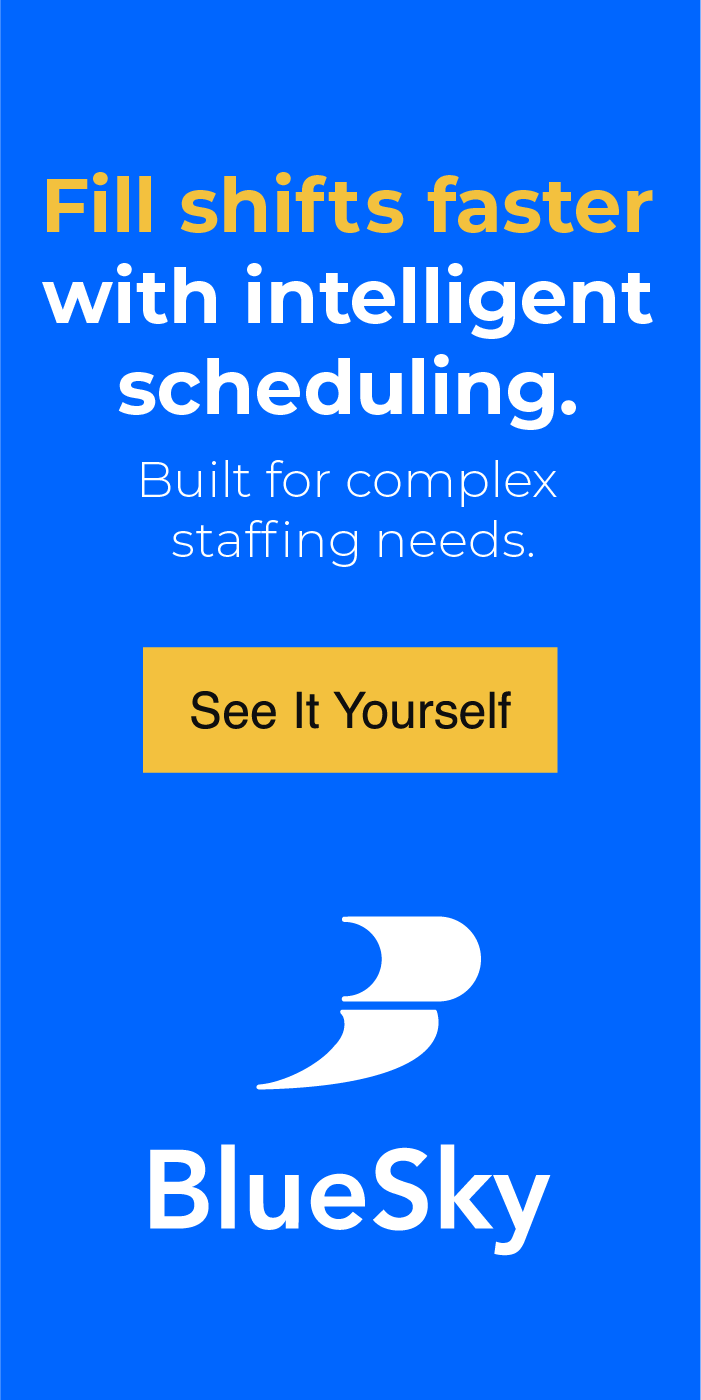Managed Service Providers (MSP) utilizing Vendor Management Systems (VMS) or Workforce Management Systems have been a part of U.S. commerce for decades, starting with Ford Motor Company and moving across all market verticals.
These systems can provide operational and financial efficiencies unavailable to firms not deploying their utilization. The need for a MSP can grow when demand for services exceeds supply. The U.S. nursing shortage is case in a single point. The ability to aggregate as many possible vendors for human capital is a great advantage of this system.
The “fill rate”, or ability to reduce hospital vacancies, assists the hospital in revenue generation, adequate staffing ratios and relief from some of the “fixed-costs” associated with full-time employees. When supply is scarce and demand is high, aggregating as many vendors as possible with uniform terms and conditions is the most effective model.
Without such systems in place, the time required to manage, pay and orchestrate labor demands while working independently with a large vendor pool is expensive and inefficient. This is where operational efficiencies of MSPs are most valuable; leveraging multiple vendors on one side of the MSP but communicating singularly on the other side for hospital management. The larger number of vendors funneled through the MSP mathematically increases the odds of meeting the high demand of healthcare workers.
Financial leverage can be realized as contract talks can be standardized across all vendors. Standardizing rates simplifies financial planning for the client. Spreading demand across multiple vendors provides pricing leverage that can’t be realized working with one supplier at a time.
HEALTHCARE & HUMAN CAPITAL
The healthcare industry has been a late adopter of human capital managed services but has long used GPOs (Group Purchasing Organizations) for supplies such as durable medical equipment.
One of the first start-ups to engage the contract labor spend of hospitals in the US was Shiftwise. Shiftwise was created in 2003 in Portland, Oregon and was originally known as Origin, Inc, acquired by AMN Healthcare (an industry dominant MSP) in 2013.
A later player to the game was Hospital Corporation of America, a for-profit system. HCA has long known the value of managed services and has utilized HealthTrust purchasing group since 1999. In 2011, HCA launched Parallon, another subsidiary designed to offer workforce management solutions throughout its expansive network of hospitals. In 2016, Parallon rebranded its workforce management solution to better identify with HCA’s original GPO subsidiary, and is now known as HealthTrust Workforce Solutions.
FocusOne Solutions is another provider in the VMS/MSP space serving hospitals for several years. FocusOne Solutions is a sister-company to Aureus Medical Group, one of the nation’s largest healthcare staffing firms with more than 30 years of experience.
Medefis, yet another provider of hospital vendor management solutions, also founded in 2003, owns significant market share.
Although there are several other vendors for vendor management and workforce solutions, the companies listed above comprise over half the agreements in the healthcare staffing world.
- The VMS/MSP is the sole gatekeeper for any agency that wishes to do business with the hospital.
- The hospital is typically forbidden to work with individual vendors; as such vendors must only work through the VMS/MSP provider.
- Every staffing firm is 100% dependent on the VMS/MSP to provide their services.
- The VMS/MSP is repository for all staffing orders and is the first to receive all orders for labor across the system.
INDUSTRY LEADERS
Let’s take a closer look at the companies we’ve previously mentioned.
HealthTrust Workforce Solutions – If you are a staffing agency wanting to provide services to a HCA hospital, get ready to go through HealthTrust. HCA brilliantly put this together in-house as a cost reduction and operations reduction play.
Shiftwise – As one of the early software solutions in the Healthcare space, Shiftwise accumulated hundreds of contracts with hospitals across the country. In a brilliant move, AMN purchased them in late 2013.
It’s just as wise to bear in mind the owning entities when choosing a software to manage your contingent workforce.
Medefis – This company was founded in 2003 and had acquired many contracts, specifically in the healthcare staffing space. As such, Medefis became a strategic target of AMN and was purchased in 2015.
FocusOne Solutions – This Omaha Nebraska firm is also a VMS/MSP driving contracts in the healthcare staffing space. They are a sister company to Aureus Medical Group, one of the nation’s largest healthcare staffing firms.
NOW BACK TO VENDOR NEUTRALITY
When the VMS/MSP providers have no affiliation with staffing firms, their sole responsibility is to provide seamless transactions between the hospital client and all subcontracted vendors. Now that the largest staffing firms have acquired these popular systems they in essence “own” every order that is generated by the hospital client. There is speculation, but no proof that these staffing firms are taking advantage of having total access to every order before any other company “sees” these opportunities.
True transparency would be the simultaneous release of all orders to all vendors, including the staffing firm that owns the VMS/MSP.
The good news is that staffing firms that have been “blocked” from direct access to these clients can now present their own VMS/MSP solutions to compete head-to-head with the largest in the industry.
A sea change is coming in this industry, and it will be driven by technology.
ABOUT THE AUTHOR
 Tim Teague
Tim Teague
President, BlueSky Synergy
{% icon icon_set=”fontawesome-5.14.0″ name=”LinkedIn” style=”REGULAR” height=”28″ purpose=”decorative” title=”LinkedIn icon” %} {% icon icon_set=”fontawesome-5.14.0″ name=”Envelope” style=”SOLID” height=”30″ purpose=”decorative” title=”Envelope icon” %}
As the original architect of BlueSky Medical Staffing Software, Tim’s vision has been at the forefront of healthcare staffing technology for more than two decades. Tim lives and works in Nashville, TN. His philosophy remains “take care of the customer and your employees, and fair profits will follow.”

